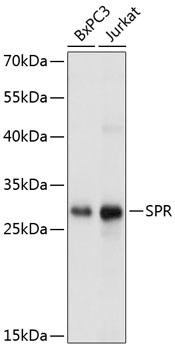ChIP Antibodies
Anti-SPR Antibody (CAB11694)
- SKU:
- CAB11694
- Product Type:
- Antibody
- Reactivity:
- Human
- Reactivity:
- Mouse
- Reactivity:
- Rat
- Host Species:
- Rabbit
- Isotype:
- IgG
- Antibody Type:
- Polyclonal Antibody
- Research Area:
- Cell Biology
Description
| Antibody Name: | Anti-SPR Antibody |
| Antibody SKU: | CAB11694 |
| Antibody Size: | 20uL, 50uL, 100uL |
| Application: | WB |
| Reactivity: | Human, Mouse, Rat |
| Host Species: | Rabbit |
| Immunogen: | Recombinant fusion protein containing a sequence corresponding to amino acids 1-261 of human SPR (NP_003115.1). |
| Application: | WB |
| Recommended Dilution: | WB 1:500 - 1:2000 |
| Reactivity: | Human, Mouse, Rat |
| Positive Samples: | BxPC-3, Jurkat |
| Immunogen: | Recombinant fusion protein containing a sequence corresponding to amino acids 1-261 of human SPR (NP_003115.1). |
| Purification Method: | Affinity purification |
| Storage Buffer: | Store at -20'C. Avoid freeze / thaw cycles. Buffer: PBS with 0.02% sodium azide, 50% glycerol, pH7.3. |
| Isotype: | IgG |
| Sequence: | MEGG LGRA VCLL TGAS RGFG RTLA PLLA SLLS PGSV LVLS ARND EALR QLEA ELGA ERSG LRVV RVPA DLGA EAGL QQLL GALR ELPR PKGL QRLL LINN AGSL GDVS KGFV DLSD STQV NNYW ALNL TSML CLTS SVLK AFPD SPGL NRTV VNIS SLCA LQPF KGWA LYCA GKAA RDML FQVL ALEE PNVR VLNY APGP LDTD MQQL ARET SVDP DMRK GLQE LKAK GKLV DCKV SAQK LLSL LEKD EFKS GAHV DFYD K |
| Gene ID: | 6697 |
| Uniprot: | P35270 |
| Cellular Location: | Cytoplasm |
| Calculated MW: | 28kDa |
| Observed MW: | 31kDa |
| Synonyms: | SPR, SDR38C1 |
| Background: | This gene encodes an aldo-keto reductase that catalyzes the NADPH-dependent reduction of pteridine derivatives and is important in the biosynthesis of tetrahydrobiopterin (BH4). Mutations in this gene result in DOPA-responsive dystonia due to sepiaterin reductase deficiency. A pseudogene has been identified on chromosome 1. |
| UniProt Protein Function: | SPR: Catalyzes the final one or two reductions in tetra- hydrobiopterin biosynthesis to form 5,6,7,8-tetrahydrobiopterin. Defects in SPR are the cause of dystonia DOPA-responsive due to sepiapterin reductase deficiency (DRDSPRD). In the majority of cases, patients manifest progressive psychomotor retardation, dystonia and spasticity. Cognitive anomalies are also often present. The disease is due to severe dopamine and serotonin deficiencies in the central nervous system caused by a defect in BH4 synthesis. Dystonia is defined by the presence of sustained involuntary muscle contractions, often leading to abnormal postures. Belongs to the sepiapterin reductase family. |
| UniProt Protein Details: | Protein type:Cofactor and Vitamin Metabolism - folate biosynthesis; EC 1.1.1.153; Oxidoreductase Chromosomal Location of Human Ortholog: 2p13.2 Cellular Component: cytosol; nucleoplasm Molecular Function:aldo-keto reductase activity; NADP binding; sepiapterin reductase activity Biological Process: nitric oxide biosynthetic process; regulation of nitric-oxide synthase activity; tetrahydrobiopterin biosynthetic process Disease: Dystonia, Dopa-responsive, Due To Sepiapterin Reductase Deficiency |
| NCBI Summary: | This gene encodes an aldo-keto reductase that catalyzes the NADPH-dependent reduction of pteridine derivatives and is important in the biosynthesis of tetrahydrobiopterin (BH4). Mutations in this gene result in DOPA-responsive dystonia due to sepiaterin reductase deficiency. A pseudogene has been identified on chromosome 1. [provided by RefSeq, Jul 2008] |
| UniProt Code: | P35270 |
| NCBI GenInfo Identifier: | 464801 |
| NCBI Gene ID: | 6697 |
| NCBI Accession: | P35270.1 |
| UniProt Secondary Accession: | P35270,Q53GI9, Q9UBB1, A8K741, D6W5H2, |
| UniProt Related Accession: | P35270 |
| Molecular Weight: | 28kDa |
| NCBI Full Name: | Sepiapterin reductase |
| NCBI Synonym Full Names: | sepiapterin reductase (7,8-dihydrobiopterin:NADP+ oxidoreductase) |
| NCBI Official Symbol: | SPR |
| NCBI Official Synonym Symbols: | SDR38C1 |
| NCBI Protein Information: | sepiapterin reductase |
| UniProt Protein Name: | Sepiapterin reductase |
| Protein Family: | Sproutin |
| UniProt Gene Name: | SPR |
View AllClose




![Anti-SPR Antibody (CAB19859)[KO Validated] Anti-SPR Antibody (CAB19859)[KO Validated]](https://cdn11.bigcommerce.com/s-rd6ounxcu2/images/stencil/590x590/products/56030/61212/anti-spr-antibody-cab19859ko-validated__05799__71341.1706533739.jpg?c=1)


